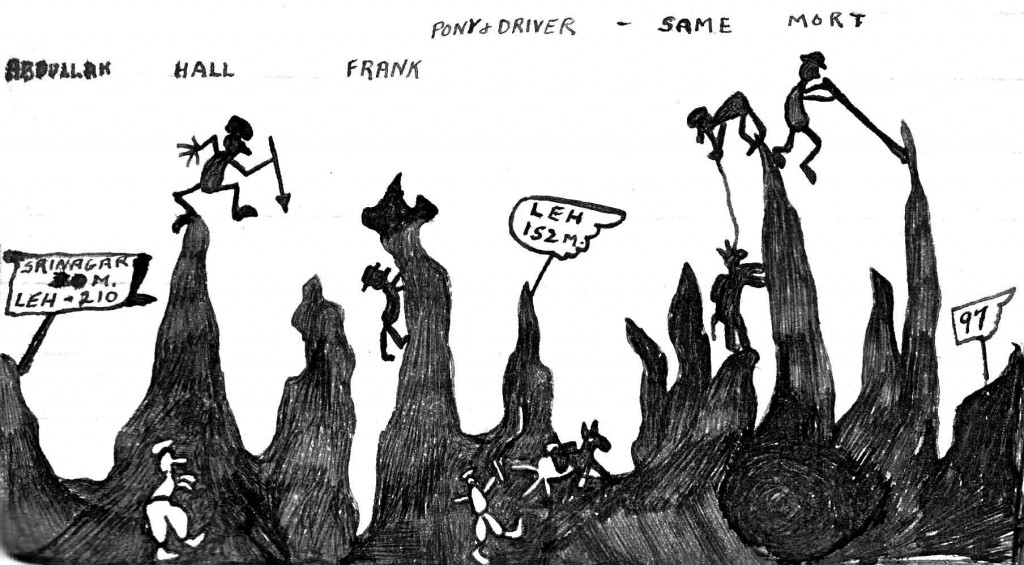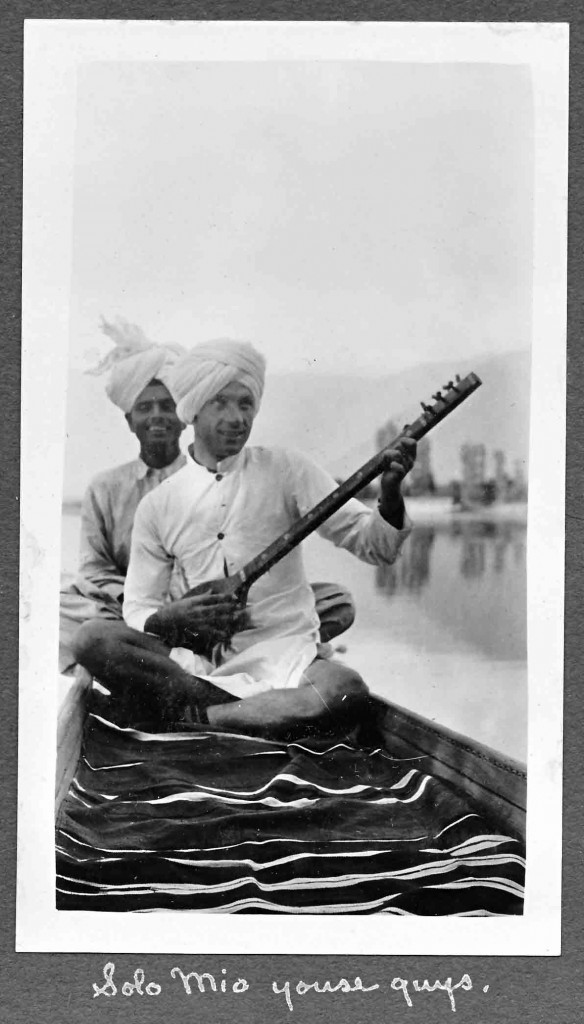Wednesday, June 5, 1929
Went to the Bund this morning and have spent the rest of the day reading “Unhappy India.” It certainly knocks England as she deserves to be knocked, and proves Miss Mayo a liar on every page. The book is a very good one from which to get information as to India, its customs, religious practices of the Hindus, and of their private lives; comparison of sexual morality of India with England, France, Spain, Russia, Austria-Hungary, America, etc. The book is very well written and is no doubt true. [See below for excerpts from this book that Hall added to this volume of the journals as a quasi-appendix. The book impressed him mightily, and because Hall planned to stay another month in India, it’s instructive at this point to see what attitudes he might have taken with him, particularly in light of what I referred to as his Ugly American incident just a few days ago on May 23rd.]
 Our wood box man has not put in an appearance today nor has our friend who was to get us the Ladakh pass turned up as he said he would. Maybe he had venal ideas as to our prosperity yesterday—which ideas changed after he saw our floating palace. Frank’s arrogance seems about to go flat with respect to this boy-friend. I doubt if Mort and I will consider it a pique if he fails altogether for he leaves an insipid taste in our mouths.
Our wood box man has not put in an appearance today nor has our friend who was to get us the Ladakh pass turned up as he said he would. Maybe he had venal ideas as to our prosperity yesterday—which ideas changed after he saw our floating palace. Frank’s arrogance seems about to go flat with respect to this boy-friend. I doubt if Mort and I will consider it a pique if he fails altogether for he leaves an insipid taste in our mouths.
Well—in the interim we won’t hold our breath. Abdulla has a chance to rent the boat next Saturday, so if we fail to go to Ladakh, we shall be on a bus for Rawal Pindi that morning. Tough, but can’t be helped.
[Unhappy India: Being a reply to Katherine Mayo’s “Mother India”, was written by Lajpat Rai and published in 1928. Mother India was a polemical account of India’s self rule by American historian Katherine Mayo. I will assume that these are direct quotations from the book.]
During all periods of the real Hindu India, women enjoyed a better position in society than that enjoyed by her European sister at any time before the mid-Victorian era.
In Vedic times, the woman was an equal of man in all that matters. She chose her husband after she had attained the age of discretion and understood her interests. There were no restrictions to widow remarriage.
In Europe of Romans, woman was treated like chattel to be disposed of by man at his pleasure. Under Roman law, the position of woman was in certain respects similar, in others inferior to that which was occupied by her in Medieval India. This status was due to political degeneracy.
 Miss Mayo’s Boston beat all when (in the year of grace 1845) it passed a municipal ordinance declaring bath tubs illegal except under medical advice.
Miss Mayo’s Boston beat all when (in the year of grace 1845) it passed a municipal ordinance declaring bath tubs illegal except under medical advice.
The position of India’s women began to deteriorate under Buddhism, but even then legally her position remained the same as before.
In no period of Hindu history was woman denied the right to make contracts, to dispose of her property, to inherit the property of her husband in certain contingencies (though on life tenure), to be a guardian of her children, and to inherit in certain contingencies as a mother, as a daughter, and as a sister.
Hon. F.D. Shore:”The fundamental principle of the English had been to make the whole Indian nation subservient, in every possible way, to the interests and benefits of themselves. They have been taxed to the utmost limit; every successive province, as it has fallen into our possession, has been made a field for higher extraction; and it has always been our boast how greatly we have raised the revenue above that which the native rulers were able to extract. The Indians have been excluded form every honour, dignity, or office which the lowest Englishman could be prevailed upon to accept.
So constant and accumulating a drain, even on England, would soon impoverish her; how severe then, must be the effect on India, where the wage of a laborer is from twopence to threepence a day.
India may or may not be a world menace. But Europe has proved to be a world-menace in history by infecting the world with venereal disease. Even today it is infecting the primitive races whom it sets out to civilize, and even today it carries a menacing amount of this dangerous stock.
Let him cast the first stone who is himself safe. Miss Mayo, if she had no propagandist axe to grind, could more usefully have given attention to the sex life of Americna boys and girls.
Imagine an utter stranger coming to a vast sub-continent like India inhabited by 300 million people with different usages in different parts, with languages not one of which is known to the stranger, who still goes about touring and does all the parts in a twelve-month’s time, and then sits down to write the most intimate side of the peoples life, making sweeping generalizations against the whole nation, basing these for the most part on her own ‘observation’ and ‘frank’ talks she had with people—does not require ‘courage’ indeed? Add to this the ‘courage’ to misquote most of the few people whose names are actually given in the story, and you will know how to evaluate Miss Mayo’s statements.
 One would have thought that the American would be the last people to declare the Hindus to be unfit for Swaraj and democracy because the existence of a class of untouchables among them. Americans never abdicated their right of self-government or allowed other people to question it, in spite of the existence among them of a larger population of ‘untouchables’ and a severer form of untouchability than that in India. When they issued their famous Declaration of Independence, slavery was an established institution in their country. It is less than seventy years ago that the American Civil War, costing hundreds and thousands of lives and millions of dollars, was fought because of this institution. Even today the untouchables in India are neither lynched nor treated so brutally as the Negroes in the United States are.
One would have thought that the American would be the last people to declare the Hindus to be unfit for Swaraj and democracy because the existence of a class of untouchables among them. Americans never abdicated their right of self-government or allowed other people to question it, in spite of the existence among them of a larger population of ‘untouchables’ and a severer form of untouchability than that in India. When they issued their famous Declaration of Independence, slavery was an established institution in their country. It is less than seventy years ago that the American Civil War, costing hundreds and thousands of lives and millions of dollars, was fought because of this institution. Even today the untouchables in India are neither lynched nor treated so brutally as the Negroes in the United States are.
 Hope lies only in a politically free India in which the progressive elements will be as free to effect new adjustments as they were and are in Japan. Till that day comes, we have to continue doing our best to overcome the impediments, but we know all the time that the results cannot be proportionate to our efforts.
Hope lies only in a politically free India in which the progressive elements will be as free to effect new adjustments as they were and are in Japan. Till that day comes, we have to continue doing our best to overcome the impediments, but we know all the time that the results cannot be proportionate to our efforts.
Miss Mayo is an avowed Indophobe and Anglophile, refusing to see any good about Indians and anything bad about the British and their rule. . .
It is easy to speak ill of the under-dog. It is difficult to defend him.
It is safe to assume that 100,000,000 of the population of India have an annual income of not more than $5.00 a head.
I do not hesitate to say that half the agricultural population do not know, from one year’s end to another, what it is to have a full meal.
40,000,000 of the people of India were seldom or never able to satisfy their hunger.
An American missionary wrote from southern India in 1902: ‘The most trying experience I have ever had was a three weeks’ tour in September of last year. My tent was surrounded day and night and one sentence dinned perpetually into my ears: We are dying of lack of food. People are living on one meal every two or three days. I once carefully examined the earnings of a congregation of 300, and found the average amounted to less than one farthing per head per day. They did not live, they eked out an existence. I have been in huts where the people were living on carrion. Yet, in all these cases there was no recognized famine! In Heaven’s name, if this is not famine, what is it? The extreme poverty of the poorer classes in India offers conditions altogether extraordinary. Life is the narrowest and hardest conceivable, with no prospect of any improvement. For a family of 6 persons, many an outfit, including house, utensils, furniture, clothing and all, is worth less than $10. The average income for such a family will not exceed 50¢ per head per month and is frequently little over half that. It may therefore be surmised that not much of this income is spent upon cultivation of the mind, sanitation, or the appearance of the dwelling.”
